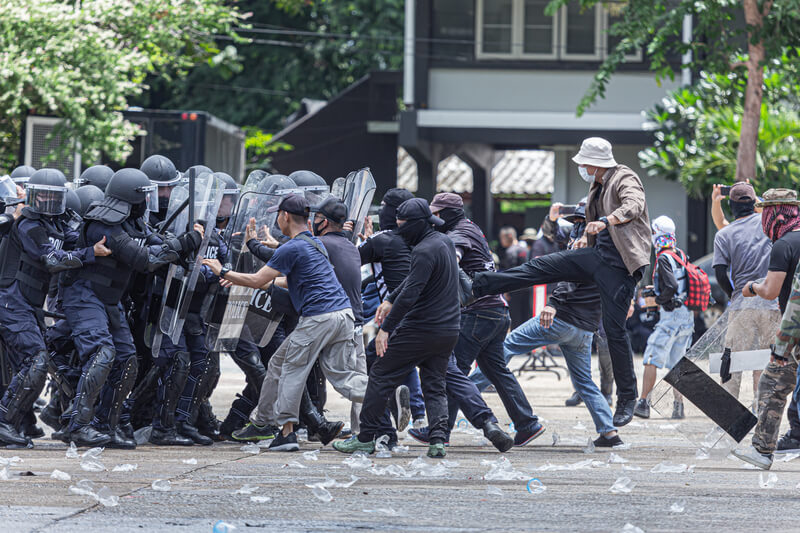The police are responsible for upholding the law and protecting the rights of citizens. However, there are instances where police officers may overstep their boundaries. Did the police violate your 14th amendment rights? Violations of the 14th Amendment can take many forms and have serious consequences.
Did The Police Violate Your 14th Amendment Rights
Our network of experienced attorneys specializes in civil rights law and can help you navigate the legal system. They understand the challenges and can help you understand your legal options. Read on to learn more, and don’t hesitate to contact us for a consultation.
Unlawful Arrest
An unlawful arrest means the police have acted beyond their lawful authority. Therefore, this action can be an abuse of power.
Law enforcement must have probable cause to make an arrest. In other words, they must have sufficient evidence to support their suspicion of a crime. They have violated protection against unreasonable search and seizure if they cannot meet this standard. This unlawful act breaks the protections under the 4th Amendment, which has incorporations in the 14th Amendment.
In addition, an unlawful arrest can also violate the 14th Amendment’s equal protection clause. Arrests based on a person’s race, ethnicity, or other characteristics violate the right to equal protection under the law.
The effects of an unlawful arrest can be significant. Physical harm, emotional distress, and losing employment opportunities are only the beginning. There are other lasting consequences, and individuals must seek legal counsel to protect their rights.
Discriminatory Policing Practices
When the police target communities for increased enforcement activity, they treat individuals differently based on protected characteristics. This action represents a violation of the equal protection clause in the 14th Amendment.
Discriminatory policing practices can lead to disproportionate enforcement. The police may also make biased decisions when deciding who to stop, search, or arrest. Discriminatory policing practices can create a culture of fear and mistrust that undermine public safety.
These practices are often the result of implicit or explicit biases perpetuated by institutionalized racism. Discriminatory policing practices are transparent violations of the 14th Amendment’s equal protection clause and can be devastating.
Racial Profiling
Stopping, searching, and arresting someone based on race or ethnicity violates the equal protection clause of the 14th Amendment.
Racial profiling can have severe consequences. It causes humiliation, fear, and loss of freedom. It can also lead to mistrust and strained relationships between the police and the communities they serve. The practice is unfair and ineffective in promoting public safety. Moreover, it undermines the principles of democracy and justice that the 14th Amendment protects. An example of this is a 1990’s era New York City policy called “stop and frisk”. This policy is still in use today, but its critics say that it encourages racial profiling.
Racial profiling violates an individual’s right to receive dignity and respect. It also perpetuates harmful stereotypes and contributes to a culture of fear and suspicion. This toxicity negatively affects the mental and emotional well-being of targeted individuals. Wrongful convictions and other miscarriages of justice result, further eroding public trust in the criminal justice system.
Failure to Provide Medical Care
Failing to provide medical care to an individual in police custody violates their 14th Amendment rights. The U.S. Constitution guarantees that no state shall deprive any person of life, liberty, or property without due process of law.
Failing to provide medical care to someone in police custody can have serious consequences. It may lead to physical harm, permanent injury, and death.
The police must provide care or seek emergency medical attention. Failure to meet this obligation can constitute deliberate indifference. Accordingly, the city, state, or federal officials may be liable for any harm or injury. The death of Tyre Nichols in Memphis in January of 2023 is an example of this type of malpractice.
Use of Excessive Force
Excessive force by the police can cause physical harm, emotional trauma, and even death. When the police use excessive force, they treat individuals as objects rather than citizens. This is also known as police brutality. Extreme measures undermine the fundamental principles of democracy and justice that the 14th Amendment protects.
One extreme example of this is the death of George Floyd at the hands of police in Minneapolis in 2020. Floyd’s death pushed the powerful Black Lives Matter movement into a fury in the summer of 2020, with the compelling slogan “I can’t breathe” erupting across the nation.
The use of excessive force by the police is particularly concerning when it affects marginalized communities. They are often disproportionately impacted by police violence and suffer violations of their constitutional rights. The systemic use of excessive force against these communities indicates institutional racism and discrimination.
Excessive force by the police can violate an individual’s 14th Amendment right to due process. It also breaks their right to protection against state action that deprives them of their liberty without due process. Furthermore, it is a human rights violation and undermines the very principles of the Constitution.
Consult With an Attorney About 14th Amendment Violations
Did you recognize one of the 14th amendment violations mentioned above? Has this type of mistreatment affected you or a loved one’s life? If so, then you should consult with a local attorney. You may have substantial reasons to seek legal recourse in civil court.
You can speak to one of our friendly representatives by calling (866) 345-6784. Alternatively, complete our brief online form to get the legal help you need today.

